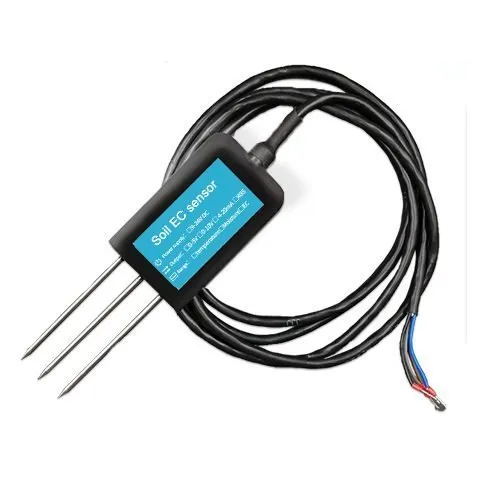JXBS-3001 Soil EC Sensor
₹4,500.0
| Brand | Sourcewell |
| Interface | RS485 |
| Moisture Range | 0-1999 mg/ Kg |
| Temperature Range | -40 to 80 Deg C |
| Operating Voltage | 9 V DC |
| Model Number | JXBS-3001 |
| Type | NPK Sensor |
| Temperature Accuracy | 0.4 Deg C |
| Moisture Accuracy | +/-3% |
The soil ec sensor is a high functional and digital display soil meter, it can quickly test conductivity of different kinds of soil. The soil ec meter is precision, quick, stable, wide range, display clear, portable and easy to test.
Characteristic:
1. Imported high quality soil ec sensor and chips.
2. Special design of soil ec meter, with a great penetration of soil.
3. Unique sensing technology, with a wide working range and quick display.
4. High quality soil salinity sensor with stable sensing ability.
5. Portable design and easy testing
6. Low power consumption, reliable function
7. IP68 soil ec meter, with fully water proof function.
You must be logged in to post a review.
Q & A
Sensors have the potential to significantly contribute to the sustainability of agricultural farming. By providing real-time data on various environmental and crop conditions, sensors enable farmers to make more informed decisions, optimize resource usage, and minimize environmental impacts. Here are some ways in which sensors promote sustainability in agriculture:
Precision farming: Sensors help farmers practice precision agriculture by precisely monitoring and managing resources such as water, fertilizers, and pesticides. This targeted approach reduces waste and minimizes the ecological footprint of farming operations.
Water management: Water is a critical resource in agriculture, and sensors can aid in efficient water management. Soil moisture sensors, for example, can measure soil moisture levels, allowing farmers to optimize irrigation practices and avoid overwatering. This helps conserve water resources and prevents waterlogging, which can lead to soil degradation.
Nutrient management: Sensors can monitor soil nutrient levels and provide data on crop nutrient requirements. By precisely applying fertilizers based on these measurements, farmers can avoid excessive fertilizer use, reduce nutrient runoff into water bodies, and mitigate the negative impacts on ecosystems.
Pest and disease monitoring: Sensors can detect the presence of pests and diseases in crops at an early stage. This early warning system enables farmers to target specific areas or plants for treatment, minimizing the use of pesticides and reducing the risk of widespread infestations. This approach promotes ecological balance and reduces chemical inputs.
Climate monitoring: Weather and climate sensors can provide valuable data on temperature, humidity, wind speed, and solar radiation. By monitoring these parameters, farmers can optimize planting times, adjust irrigation schedules, and implement appropriate crop management strategies in response to changing weather patterns. This helps maximize crop productivity while reducing the risk of crop loss due to extreme weather events.
Livestock management: Sensors can also be utilized in livestock farming to monitor animal health, behavior, and environmental conditions. This data can help farmers detect diseases early, optimize feed and water consumption, and improve animal welfare. By efficiently managing livestock, farmers can reduce waste and resource consumption while ensuring sustainable animal production.
While sensors offer great potential for sustainability in agriculture, it's important to consider the overall lifecycle impact of these technologies. Factors such as energy consumption during manufacturing, disposal of electronic components, and data privacy concerns should be addressed to ensure the sustainability of sensor systems themselves.
Overall, when implemented thoughtfully and integrated into farm management practices, sensors can contribute to more sustainable and efficient agricultural farming systems.
General Inquiries
There are no inquiries yet.



Reviews
There are no reviews yet.